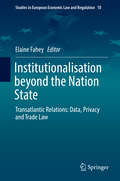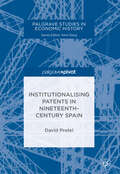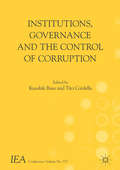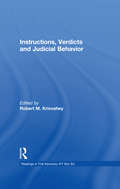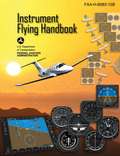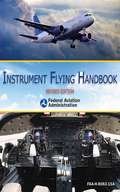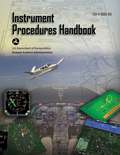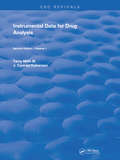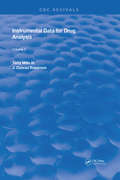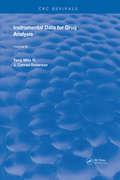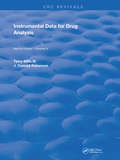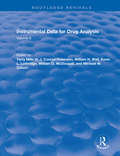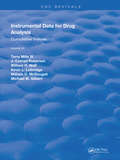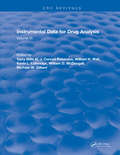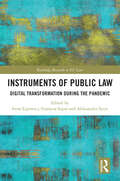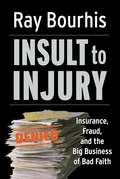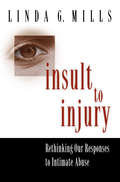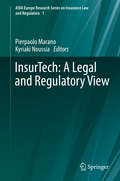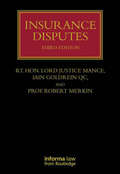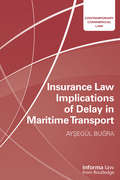- Table View
- List View
Institutionalisation beyond the Nation State: Transatlantic Relations - Data, Privacy And Trade Law (Studies in European Economic Law and Regulation #10)
by Elaine FaheyThis volume collects papers that explore institutionalisation in contemporary transatlantic relations. Policymakers, lawyers, and political scientists reflect on contemporary understandings of the process as an integration of regimes and orders from an EU perspective. The papers assess whether contemporary transatlantic relations call for a different approach to global governance with a heightened emphasis on institutionalisation. The book explores a diverse range of case studies of interest to a broad readership. In particular, it focuses upon two cutting-edge issues: transatlantic data privacy rules that are emerging after the post-Edward Snowdon / NSA / PRISM revelations; and trade aspects, especially the Transatlantic Trade and Investment Partnership (TTIP) Agreement. The contributors consider these case studies from a variety of perspectives, honing in on the dynamism, method, and high politics of transatlantic relations as they have recently evolved. They critically explore the commonly held assumption that transatlantic relations have historically been considered quasi-institutionalised at best or, at worst, lacking in terms of laws and institutions. Is institutionalisation a useful meeting point for all disciplines? Does it explain regional integration meaningfully across subjects? Can institutionalisation serve to promote accountability and good governance? Contributors across disciplines and subjects address these increasingly challenging and salient questions.
Institutionalising Patents in Nineteenth-Century Spain (Palgrave Studies in Economic History)
by David PretelThis book examines the development of the Spanish patent system in the years 1826 to 1902, providing a fundamental reassessment of its evolution in an international context. The Spanish case is particularly interesting because of this country’s location on the so-called European periphery and also because of the centrality of its colonial dimension. Pretel gauges the political regulation and organisation of the system, showing how it was established and how it evolved following international patterns of technological globalisation and the emergence of the ‘international patent system’ during the late nineteenth century. Crucially, he highlights the construction and evolution of the patent system in response to the needs of Spain's technologically dependent economy. The degree of industrial backwardness in mid-nineteenth-century Spain set the stage for the institutionalisation of its modern patent system. This institutionalisation process also entailed the introduction of a new technological culture, social infrastructure and narrative that supported intellectual property rights. This book is important reading to all those interested in the history of patents and their role in globalisation.
Institutions, Governance and the Control of Corruption (International Economic Association Series)
by Kaushik Basu Tito CordellaThis book considers how emerging economies around the world face the challenge of building good institutions and effective governance, since so much of economic development depends on having these in place. The promotion of shared prosperity and the battle against poverty require interventions to reach out to the poor and the disadvantaged. Yet time and again we have seen such effort foild or diminished by corruption and leakage. The creation of good governance and institutions and structures to combat corruption require determination and passion but also intricate design rooted in data, analysis, and research. In this book, leading researchers from around the world bring to the table some of the best available ideas to help create better governance structures, design laws for corruption control, and nurture good institutions.
Institutions, Property Rights, and Economic Growth
by Sebastian Galiani Itai SenedThis volume showcases the impact of the work of Douglass C. North, winner of the Nobel Prize and father of the field of new institutional economics. Leading scholars contribute to a substantive discussion that best illustrates the broad reach and depth of Professor North's work. The volume speaks concisely about his legacy across multiple social sciences disciplines, specifically on scholarship pertaining to the understanding of property rights, the institutions that support the system of property rights, and economic growth.
Instructions, Verdicts, and Judicial Behavior (Readings in Trial Advocacy A/T Soc Sci #Vol. 4)
by Robert M. KrivosheyFirst Published in 1994. Volume 4 in the 4-volume anthology of scholarly articles titled Readings in Trial Advocacy and the Social Sciences; a series seeking to increase our understanding of courtroom dynamics. This fourth volume consists of six jury instructions, six verdicts and two articles on judicial behaviour. These collection raises issues ranging from ability of jurors to understand judicial instructions to the ability of attorneys to predict the outcome of pending litigation.
Instrument Flying Handbook (Federal Aviation Administration): FAA-H-8083-15B
by Federal Aviation AdministrationThis is the FAA's primary pilot resource for instrument flight rules and training. It (IFR) covers everything pertinent to operating an aircraft, both in instrument meteorological conditions (IMC) and without reference to outside visuals, relying solely on the information gleaned from the cockpit. Information applies to both analog and electronic flight displays, and is organized into separate coverage of the traditional and pictorial displays.Instrument Flying Handbook includes chapters on national airspace system, the air traffic control system, human factors, aerodynamics, flight instruments, flight maneuvers for IFR operations, navigation, emergency operations, as well as helicopter operations and more. Advanced systems are covered, including flight management systems, the primary flight display (PFD) and multi-function display (MFD), synthetic vision, and traffic advisory systems. Instrument clearance shorthand is discussed, and an instrument training lesson guide is provided.The Instrument Flying Handbook is designed for use by flight instructors, pilots preparing for the Instrument Rating FAA Knowledge and Practical Exams, and instrument-rated pilots looking for a refresher or preparing for an Instrument Proficiency Check (IPC). This edition features with full-color illustrations and diagrams, along with a comprehensive glossary and index.
Instrument Flying Handbook: Revised Edition
by Federal Aviation AdministrationThe Federal Aviation Administration’s Instrument Flying Handbook provides pilots, student pilots, aviation instructors, and controllers with the knowledge and skills required to operate an aircraft in instrument meteorological conditions.This up-to-date edition is illustrated with full-color graphics and photographs and covers topics such as basic atmospheric science, the air traffic control system, spatial disorientation and optical illusions, flight support systems, and emergency responses. The book’s two appendixes contain information on clearance shorthand and an instrument training lesson guide. Readers will also find a handy glossary and index.Since many questions on FAA exams are taken directly from the information presented in this text, the Instrument Flying Handbook is a great study guide for potential pilots looking for certification and a perfect gift for any aircraft or aeronautical buff.Additional topics included throughout this text include:Ground-based radar navigationApproaches to civil airportsFlying and landing in difficult weather conditionsAircraft system malfunctionsAirspace classificationDifferential global positioning systemsAnd many more!
Instrument Procedures Handbook: FAA-H-8083-16A (FAA Handbooks Ser.)
by Federal Aviation AdministrationThis is the new 2015 edition of the FAA's previous "Instrument Procedures Handbook" (previously the FAA-H-8083-16).This book covers all of the information needed to operate safely within the airspace system. In the FAA's "Instrument Procedures Handbook" (#FAA-H-8083-16A) the emphasis is placed on operations and procedural information for real-world use, which makes this the next logical step for pilots after learning basic instrument skills from the FAA's "Instrument Flying Handbook" (#FAA-H-8083-15B). Using this book, pilots can more directly apply the concepts to their current flying situation, and learn how their acquired skills are best used in today’s IFR environment. Considered industry-wide as a top source for instrument procedures information and a "must read” for all instrument pilots, this new 2015 edition brings pilots the latest changes to procedures and even more insights and guidance on how to operate safely within the national airspace system. Detailed information is provided for every navigation receiver and phase of flight on the required precision necessary to stay within protected airspace and to make a successful approach.While it was designed as a reference for professional pilots, the specialized glossary, index, full-color illustrations and photographs in this book make it a valuable training aid for flight instructors, instrument pilots, and instrument students alike. Each topic covered is well-detailed and explained in user-friendly terms, along with full-color depictions to aid understanding.Instrument flight instructors, pilots, and students will need this resource since it is used as a reference for the Airline Transport Pilot and Instrument Knowledge Tests and for the Practical Test Standards. Whether a pilot is a seasoned professional or recently completed an Instrument Rating course, this FAA handbook is sure to encourage more precise instrument techniques and ultimately create a safer pilot.
Instrument Procedures Handbook: Faa-h-8083-16a (FAA Handbooks Ser.)
by Federal Aviation AdministrationDesigned as a technical reference for instrument-rated pilots who want to maximize their skills in an "Instrument Flight Rules” environment, this revised and up-to-date edition of the Federal Aviation Administration’s Instrument Procedures Handbook contains the most current information on FAA regulations, the latest changes to procedures, and guidance on how to operate safely within the National Airspace System in all conditions. Featuring an index, an appendix, a glossary, full-color photos, and illustrations, Instrument Procedures Handbook is the most authoritative book on instrument use anywhere.
Instrumental Data for Drug Analysis, Second Edition: Volume I (Elsevier Series In Forensic And Police Science)
by Terry MillsCompiled with the most sophisticated chromatographic and spectrometric instruments available, this complete and self-contained seven-volume reference provides forensic, toxicology, and clinical laboratories with up-to-date information on 1,600 drugs and drug-related compounds-one of the largest collections of analytical data generated from a single source. Instrumental Data for Drug Analysis contains timely, quality data presented in a large, easily usable format. It is an essential reference in the libraries of all toxicology, analytical chemistry, and forensic specialists and laboratories.
Instrumental Data for Drug Analysis, Second Edition: Volume II (Elsevier Series In Forensic And Police Science)
by J. Conrad Roberson Terry Mills IIICompiled with the most sophisticated chromatographic and spectrometric instruments available, this complete and self-contained seven-volume reference provides forensic, toxicology, and clinical laboratories with up-to-date information on 1,600 drugs and drug-related compounds-one of the largest collections of analytical data generated from a single source. Instrumental Data for Drug Analysis contains timely, quality data presented in a large, easily usable format. It is an essential reference in the libraries of all toxicology, analytical chemistry, and forensic specialists and laboratories.
Instrumental Data for Drug Analysis, Second Edition: Volume III (Elsevier Series In Forensic And Police Science)
by Terry Mills III J.Conrad RobersonCompiled with the most sophisticated chromatographic and spectrometric instruments available, this complete and self-contained seven-volume reference provides forensic, toxicology, and clinical laboratories with up-to-date information on 1,600 drugs and drug-related compounds-one of the largest collections of analytical data generated from a single source. Instrumental Data for Drug Analysis contains timely, quality data presented in a large, easily usable format. It is an essential reference in the libraries of all toxicology, analytical chemistry, and forensic specialists and laboratories.
Instrumental Data for Drug Analysis, Second Edition: Volume IV (Elsevier Series In Forensic And Police Science)
by J. Conrad Roberson Terry Mills IIICompiled with the most sophisticated chromatographic and spectrometric instruments available, this complete and self-contained seven-volume reference provides forensic, toxicology, and clinical laboratories with up-to-date information on 1,600 drugs and drug-related compounds-one of the largest collections of analytical data generated from a single source. Instrumental Data for Drug Analysis contains timely, quality data presented in a large, easily usable format. It is an essential reference in the libraries of all toxicology, analytical chemistry, and forensic specialists and laboratories.
Instrumental Data for Drug Analysis, Second Edition: Volume V (Forensic And Police Science Ser.)
by Terry Mills III, J. Conrad Roberson, William H. Wall, Kevin L. Lothridge, William D. McDougall, and Michael W. GilbertWith the addition of this fifth volume, Instrumental Data for Drug Analysis, Second Edition is the definitive work on drug analysis. The complete five-volume set contains over 6,000 spectra on 1,600 drugs and related compounds, incorporating numerous chromatographic and spectrometric instruments, and includes a total of 13 appendices. Professionals working in forensic, crime, clinical, and toxicological laboratories will find this volume to be an invaluable reference that they will rely on daily. Among volume five's features are: monographs for each compound - including chemical titles, molecular formula and weights, and mass spectra data on over 250 drug derivatives.
Instrumental Data for Drug Analysis, Second Edition: Volume VII (Forensic And Police Science Ser.)
by Terry MillsVolume 7 of this classic collection presents a comprehensive index to the first six volumes, providing quick and easy access to the data in this exhaustive resource, and completing the set.
Instrumental Data for Drug Analysis: Volume VI (Forensic And Police Science Ser.)
by Terry Mills III J. Conrad Roberson William H. Wall Kevin L. Lothridge William D. McDougall Michael W. GilbertCompiled with the most sophisticated chromatographic and spectrometric instruments available, this complete and self-contained seven-volume reference provides forensic, toxicology, and clinical laboratories with up-to-date information on 1,600 drugs and drug-related compounds-the largest collection of analytical data generated from a single source. This is the only single source that contains timely, quality data of this type presented in a large, easily usable format. This will be an essential reference in the libraries of all toxicology, analytical chemistry, and forensic science specialists and laboratories.
Instruments of Public Law: Digital Transformation during the Pandemic (Routledge Research in EU Law)
by Irena Lipowicz, Grażyna Szpor and Aleksandra SyrytThe Covid 19 pandemic has revealed the need to verify the existing principles of functioning of public authorities, in relation to various decision-making processes, both at the conceptual level and at law implementation. The action of the legislator and public administration towards the society and the economy is conducted using peculiar instruments to control the public administration system. These instruments are likely to be of a public or private law nature. This book takes a comparative approach to examine the issues related to digital transformation in the times of a pandemic regarding the use of public-law instruments in Poland and the wider European context. In particular, the research aims to identify what stage the development of digital solutions in the state's organization and its authorities has reached, including the organization of public administration; what the has pandemic changed. Exploring the concepts of digital transformation, pandemic and public-law instruments, it provides an analysis of European and national public-law instruments using digital solutions, security and cybersecurity during a pandemic, and concrete issues such as public administration, health protection and social security, economic activity and the system of public finances, and education during the pandemic is performed. Establishing whether particular solutions are durable and to what extent they create a certain standard of response to a threat, it makes recommendations for determining which of the existing solutions is useful for the functioning of the state and its organs and facilitates the performance of their tasks.
Insult to Injury: Insurance, Fraud, and the Big Business of Bad Faith
by Ray BourhisBourhis, a crusading California attorney specializing in insurance bad-faith litigation, exposes egregious stories of ill and disabled people being forced into bankruptcy and ruin when their insurance companies dump them without cause. At the center of his explanation of the industry's shady practices is Joan Hangarter, who won a $7. 7 million judgment against disability carrier UnumProvident after it cut off her benefits. Bourhis outlines the comprehensive systems the industry has in place for targeting and terminating expensive claims without just cause, and explains how recent US Supreme Court decisions and the inaction of Congress actually facilitate insurer fraud. Annotation ©2005 Book News, Inc. , Portland, OR (booknews. com)
Insult to Injury: Rethinking our Responses to Intimate Abuse
by Linda G. MillsLocking up men who beat their partners sounds like a tremendous improvement over the days when men could hit women with impunity and women fearing for their lives could expect no help from authorities. But does our system of requiring the arrest, prosecution, and incarceration of abusers lessen domestic violence or help battered women? In this already controversial but vitally important book, we learn that the criminal justice system may actually be making the problem of domestic violence worse. Looking honestly at uncomfortable facts, Linda Mills makes the case for a complete overhaul and presents a promising alternative. The evidence turns up some surprising facts about the complexities of intimate abuse, facts that run against mainstream assumptions: The current system robs battered women of what power they do hold. Perhaps as many as half of women in abusive relationships stay in them for strong cultural, economic, religious, or emotional reasons. Jailing their partners often makes their situations worse. Women are at least as physically violent and emotionally aggressive as are men toward women, and women's aggression is often central to the dynamic of intimate abuse. Informed by compelling evidence, personal experience, and what abused women themselves say about their needs, Mills proposes no less than a fundamentally new system. Addressing the real dynamics of intimate abuse and incorporating proven methods of restorative justice, Mills's approach focuses on healing and transformation rather than shame or punishment. Already the subject of heated controversy, Insult to Injury offers a desperately needed and powerful means for using what we know to reduce violence in our homes.
InsurTech: A Legal and Regulatory View (AIDA Europe Research Series on Insurance Law and Regulation #1)
by Kyriaki Noussia Pierpaolo MaranoThis Volume of the AIDA Europe Research Series on Insurance Law and Regulation explores the key trends in InsurTech and the potential legal and regulatory issues that accompany them. There is a proliferation of ideas and concepts within InsurTech that will fundamentally change the market in the next few years. These innovations have the potential to change the way the insurance industry works and alter the relationships between customers and insurers, resulting in insurance products that are more closely aligned to individual preferences and priced more appropriately to the risk. Increasing use of technology in the insurance sector is having both a disruptive and transformative impact on areas including product development, distribution, modelling, underwriting and claims and administration practice. The result is a new industry, known as InsurTech. But while the insurance market looks to technology for greater efficiency, regulators are beginning to raise concerns about managing potential risks. The first part of the book examines technological innovations relevant for insurance, such as FinTech, InsurTech, Sharing Economy, and the Internet of Things. The second part then gathers contributions on insurance contract law in a digitalized world, while the third part focuses on cyber insurance and robots. Last but not least, the fourth part of the book discusses legal and ethical questions regarding autonomous vehicles and transportation, including the shipping industry, as well as their impact on the insurance sector and civil liability. Written by legal scholars and practitioners, the book offers international, comparative and European perspectives. The Chapters "FinTech, InsurTech and the Regulators" by Viktoria Chatzara, "Smart Contracts in Insurance. A Law and Futurology Perspective" by Angelo Borselli and "Room for Compulsory Product Liability Insurance in the European Union for Smart Robots?” by Aysegul Bugra are available open access under a CC BY 4.0 license at link.springer.com.
Insurable Interest and the Law
by Franziska Arnold-DwyerThis book assesses the role of the doctrine of insurable interest within modern insurance law by examining its rationales and suggesting how shortcomings could be fixed. Over the centuries, English law on insurable interest – a combination of statutes and case law – has become complex and unclear. Other jurisdictions have relaxed, or even abolished, the requirement for an insurable interest. Yet, the UK insurance industry has overwhelmingly supported the retention of the doctrine of insurable interest. This book explores whether the traditional justifications for the doctrine – the policy against wagering, the prevention of moral hazard and the doctrine’s relationship with the indemnity principle – still stand up to scrutiny and argues that, far from being obsolete, they have acquired new significance in the global financial markets and following the liberalisation of gambling. It is also argued that the doctrine of insurable interest is an integral part of a system of insurance contract law rules and market practice. Rather than rejecting the doctrine, the book recommends a recalibration of insurable interest to afford better pre-contractual transparency to a proposer as to the suitability of the policy to his or her interest in the subject-matter to be insured. Providing a powerful defence for the retention of insurable interest, this book will appeal to both academics and practitioners working in the field of insurance law.
Insurance Class Actions in the United States
by Laura Zakaras Stephen J. Carroll Ingo Vogelsang Nicholas M. PaceClass actions, which are civil cases in which parties initiate a lawsuit on behalf of other plaintiffs not specifically named in the complaint, often make headlines and arouse policy debates. However, policymakers and the public know little about most class actions. This book presents the results of surveys of insurers and of state departments of insurance to learn more about class litigation against insurance companies.
Insurance Disputes
by IAIN GOLDREIN; ROBERT MERKINWritten by an impressive team of specialist contributors, Insurance Dispute is the authoritative guide to litigation for both the insurer and the insured. Divided into two parts – principles of law and their practical use in individual types of insurance, it aims to identify and resolve questions such as: • How should the claimant handle a dispute? • Is the claim within the cover? • When should an insurer dispute cover? • What steps can an insurer take to deny cover? Updated and revised to include new chapters on marine insurance, the Financial Ombudsman Service and ATE insurance, Insurance Disputes is essential reading for anyone involved in insurance law and litigation.
Insurance Distribution Directive: A Legal Analysis (AIDA Europe Research Series on Insurance Law and Regulation #3)
by Kyriaki Noussia Pierpaolo MaranoThis open access volume of the AIDA Europe Research Series on Insurance Law and Regulation offers the first comprehensive legal and regulatory analysis of the Insurance Distribution Directive (IDD). The IDD came into force on 1 October 2018 and regulates the distribution of insurance products in the EU. The book examines the main changes accompanying the IDD and analyses its impact on insurance distributors, i.e., insurance intermediaries and insurance undertakings, as well as the market. Drawing on interrelations between the rules of the Directive and other fields that are relevant to the distribution of insurance products, it explores various topics related to the interpretation of the IDD – e.g. the harmonization achieved under it; its role as a benchmark for national legislators; and its interplay with other regulations and sciences – while also providing an empirical analysis of the standardised pre-contractual information document. Accordingly, the book offers a wealth of valuable insights for academics, regulators, practitioners and students who are interested in issues concerning insurance distribution.
Insurance Law Implications of Delay in Maritime Transport (Contemporary Commercial Law)
by Aysegul BugraDelay in a marine adventure is an important and frequent phenomenon of maritime transport as it affects various parties and their interests. Insurance Law Implications of Delay in Maritime Transport is the first single book to deal specifically with this issue in the context of insurance law. The book addresses the losses and expenses that may arise from delay or loss of time in maritime transport, the types of insurance available covering or excluding losses arising from it and the impact of delay on voyage policies. The author, Ayşegül Buğra, critically examines and evaluates the scope of several different types of marine insurance policies, including but not limited to: hull and machinery, cargo, freight, loss of hire and marine delay in start-up insurance. Furthermore, the book analyses the current law by tracing back the relevant common law authorities to the 18th century and examines the wordings used in practice from that time to today with a comprehensive and critical approach. This unique text will be of great interest to legal practitioners, shipping professionals and academics alike.
